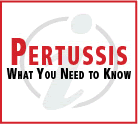Pertussis (Whooping Cough)

Pertussis (whooping cough) is a highly contagious, vaccine-preventable respiratory disease. Pertussis most commonly affects infants and young children and can be fatal, especially in babies less than 1 year of age.
Pertussis is caused by a bacteria found in the mouth, nose and throat of an infected person. Transmission to others occurs during close contact with an infected person, most commonly by airborne droplets of respiratory secretions.
Prevention
The best way to protect against pertussis is immunization. The best way to reduce the incidence of pertussis is to have a highly vaccinated population. This should be accomplished through physicians' offices and public health clinics. Five doses of DTaP at ages 2, 4, 6, 12-18 months and 4-6 years are recommended. The childhood vaccine is called DTaP, and the pertussis booster vaccine for adolescents and adults is called Tdap. All adolescents and adults are encouraged to get one lifetime dose of the booster vaccine. Talk to your healthcare provider about getting vaccinated.
Anyone who is exposed to pertussis should also be given antibiotics to prevent the disease.
Symptoms
Pertussis usually starts with cold or flu-like symptoms such as runny nose, sneezing, fever and a mild cough. These symptoms can last up to two weeks and are followed by increasingly severe coughing spells. Fever, if present, is usually mild. Symptoms appear between six to twenty-one days (average 7-10) after exposure to the pertussis bacteria.
Among older children and adults, the disease usually results in symptoms that can be mistaken for bronchitis and Upper Respiratory Infections - persistent cough, but no whoop. In infants younger than 6 months, apnea (cessation of breathing) is a common manifestation and whoop may be absent.
It is important to remember that while pertussis is most often considered a young child's disease, it can occur at any age. Pertussis should be considered in older children and adults who have a persistent cough lasting more than 7-14 days, that cannot be attributed to another specific illness. Untreated, these older children and adults can act as a reservoir for pertussis disease and infect younger children.
Treatment
Pertussis is treated with antibiotics and patients are advised to take all prescribed medication and avoid contact with anyone, particularly small infants and children. Anyone who is exposed to pertussis should also be given antibiotics to prevent the disease.
